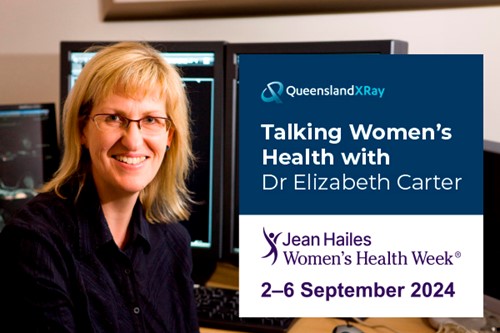Women’s Health Week, 2nd – 6th September, is a week dedicated to shining a light on some of the biggest issues in women’s health today and led by not-for-profit Jean Hailes for Women’s Health. Throughout this week we will be showcasing some of our Radiologists who specialise in women’s imaging, who share their perspectives on what it means to work in women’s health.
Dr Carter believes that imaging facilities and services play a huge role in achieving better health for Australian women. Each day, she is driven by doing the best she can to assist patients to improve their health.
When contemplating her role in providing specialised services to women, Dr Carter says “I believe that female doctors have an innate ability to connect with female patients and provide them with caring, gentle professional imaging and needle procedures. Particularly with breast cancer/ breast symptoms, gynaecology and obstetrics (where more TLC is needed), but also in more general areas such as cardiac/chest, musculoskeletal, neurological and abdominal imaging."
Technology has had a huge impact on the diagnosis of disease in the last 60 years and this has led to large improvements in care and outcomes for patients. Dr Carter explains that there has been “markedly improved prognosis of breast cancer by early detection with imaging, high risk MRI screening and biopsy/pre-surgical technology”. Advances in technology have also meant there is greater opportunity for women to have babies with assisted IVF treatment as well as for abnormalities to be detected early. There has been a decrease in mortality and morbidity rates in both women and babies through good pregnancy dating, the detection of problems requiring close monitoring, baby’s delivery in a tertiary centre and early paediatric treatment. Imaging is integral to all of this and is often the early driver of improved patient care and health outcomes.
Whilst imaging technology has advanced, a patient’s overall experience is dependent on more than just this. At Queensland X-Ray we have a team of skilled, experienced and dedicated radiologists, sonographers, radiographers, and nurses who undergo regular training to keep them at the forefront of their profession. These medical professionals are supported by an equally committed team of skilled and knowledgeable staff who work behind the scenes to help each and every patient, as well as referring doctors. “Our talented staff who work tirelessly in the background are so important to our business. From our administrators and receptionists to our marketing, finance and operations staff to our engineers and IT team, we all work together to provide excellence in patient care. I am proud of both the high calibre of health care we provide to patients and the high level of service we provide to referring doctors”, says Dr Carter.
Dr Carter tells us that there has also been huge improvement in cardiac diagnosis. “It has gone from ECG in isolation to more meaningful imaging with ultrasound (echo), CT, MRI, and nuclear medicine non-invasively, all with frequent ongoing technological improvements. In addition, the advent of PET/CT in cancer care has been instrumental in improved cancer and cancer spread detection and management”.
Dr Carter is pleased to see equitable access to health care is changing in Australia. “Whilst regional and remote inequalities still exist, the arrival of digital technologies and reporting remotely has created opportunities for sub-specialty radiologists to review these patient’s images. This is a huge recent advancement and health improvement for women living in regional and remote communities.

